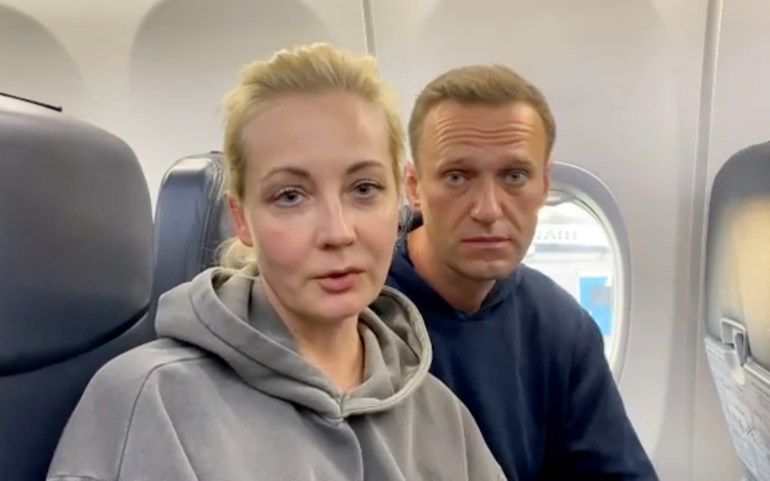Russian security forces arrested a number of aides and supporters of the opposition, Alexei Nvalny, before his return Sunday evening from Germany, and diverted his plane to another airport in the Russian capital, after the end of a treatment flight that lasted months after he was poisoned in Russia.
Al-Jazeera correspondent said that the riot police stormed the hall of "Vinkovo" airport in the Russian capital and dispersed the supporters of Nafalni (44 years) who were waiting for him inside, and took them out and the journalists who were covering the event.
The reporter added that the police arrested Nafalni’s lawyer and other opponents at the airport, about an hour before Navalny’s arrival.
Later, the authorities closed Vankono Airport to foreign flights, and transferred them to Sheremetyevo Airport, which is in turn located on the outskirts of Moscow.
The storming and arrests took place at Vankono Airport while the plane carrying one of the most prominent leaders of the Russian opposition was on its way to Moscow, where it took off earlier today from Berlin with the Russian opposition and his wife on board.
Upon boarding the plane that took him from Berlin to Moscow, Nafalni confirmed that he believed that the authorities would not arrest him, and that there was nothing to convict him, stressing that he was innocent.
However, the Russian Law Enforcement Authority had announced its intention to arrest him upon his arrival, against the backdrop of a previous court ruling against him, while the Russian Public Prosecution warned his supporters against gathering at the airport.
Alexei Nvalny and his wife, Yulia, on the plane that took them to Moscow (European)
A file from Germany
Before the Russian dissident traveled back to his country, Germany handed Russia a file containing information about his poisoning, and the Russian Foreign Ministry confirmed that it had received the file, but said that there was nothing new in it.
The file of the attempted murder of Nevalni added more tensions to relations between Russia on the one hand and Germany and other European Union countries, which confirmed that the Russian opposition had been poisoned by the nerve gas "Novochik".
Since late August, Nvalny has lived in Germany after he became severely ill during his return trip from Siberia to Moscow as part of an election campaign and was hospitalized in the Russian city of Omsk, where he stayed for 48 hours, then he was transferred to Berlin in a coma after the pressure of those close to him.
He was discharged from the hospital in early September, and 3 European laboratories concluded that he had been poisoned by "Novichok", which was developed during the Soviet era. This conclusion was confirmed by the Organization for the Prohibition of Chemical Weapons, despite Moscow's repeated denials.
Nafalni says that the Russian security services orchestrated to assassinate him by direct order of President Vladimir Putin, but Moscow denies this altogether, denouncing this narrative, which it considered a Western conspiracy, and questioned the healthy lifestyle of the opposition.
The Russian prison authorities say that Nvalni did not respect the conditions of a suspended prison sentence issued against him in 2014, when he was in Germany, which requires him to go at least twice a month to the prison administration.
At the end of last December, an investigation was opened against Nafalni on charges of "widespread fraud," and the Russian Federal Investigation Committee indicated that suspicions are surrounding his spending of 3.9 million euros for personal purposes, and the source of these funds was donations collected by several organizations he runs himself.
Nafalni says he never considered staying outside Russia because he never left his homeland of his own free will, and "arrived in Germany in a recovery fund."

